1051 The enigmatic Joachim Foikis
Fool’s Gold: The Life and Legacy of Vancouver’s Official Town Fool
by Jesse Donaldson
Vancouver: Anvil Press, 2020
$18.00 / 9781772141467
Reviewed by Sheldon Goldfarb
*
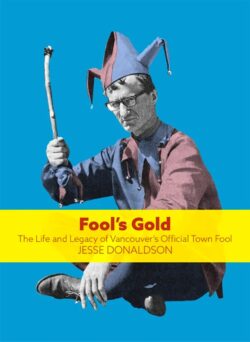 In the spring of 1967, if you went to the courthouse in downtown Vancouver between 2 and 3 p.m., you might have encountered a strange sight: a thirty-something man dressed in a jester’s outfit, waving a sort of wand, and engaging passersby in musings on the meaning of life. Most of the people he talked to seemed to enjoy his philosophizing, mixed in with a little foolery, but some were quite upset — most notably the Vancouver mayor at the time, Tom Campbell.
In the spring of 1967, if you went to the courthouse in downtown Vancouver between 2 and 3 p.m., you might have encountered a strange sight: a thirty-something man dressed in a jester’s outfit, waving a sort of wand, and engaging passersby in musings on the meaning of life. Most of the people he talked to seemed to enjoy his philosophizing, mixed in with a little foolery, but some were quite upset — most notably the Vancouver mayor at the time, Tom Campbell.
When the jester, a former UBC student who hailed from Poland via Berlin and Toronto, won a Canada Council grant for $3,500 in order to perform his role as Vancouver’s Town Fool, Mayor Campbell was appalled, and denounced the grant as a waste of taxpayers’ money. Some others who were scraping by on pensioners’ incomes were not too happy either, but the mainstream media, the Sun and the Province, the Globe & Mail, and the CBC were enthralled, expressing appreciation for the Fool (Joachim Foikis by name), who they saw as providing a much needed alternative to stodgy middle-class values and the pursuit of money.
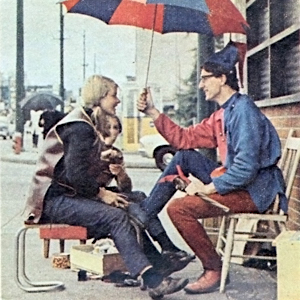
Jesse Donaldson, in this short account, tries to bring the Foikis Fool phenomenon into focus, but it is a difficult task because information on Foikis is scant. There is plenty on his fifteen minutes of fame, which lasted from 1967 until 1970, but little on his life before and after. Above all, what motivated the man? He had seemed a serious, rather introverted student at UBC, though the fact that he pursued one degree after another (moving from social work to theology to library science) may have been a sign that he was already out of step with the times — and of course the times were out of step with the times. The Sixties were underway, the counterculture was to the fore, hippies appeared.
Was Foikis a hippie? Donaldson tries to distinguish him from them. Foikis himself said he was different because they wanted to drop out while he wanted to drop in. Drop in to what? Trouble? He certainly got into trouble at times for disrupting meetings, yelling at police, and riding a donkey-cart through town. He was arrested and fined, all in aid of pricking our bubbles of complacency, it seems, which would have been a natural Sixties thing to do.
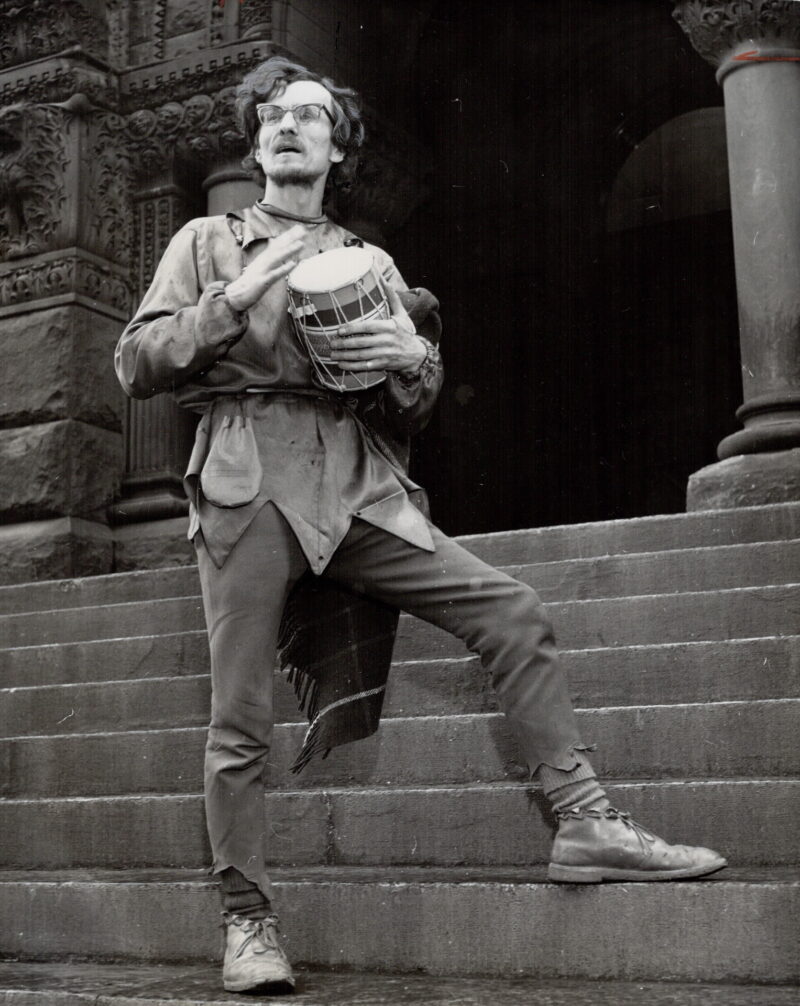
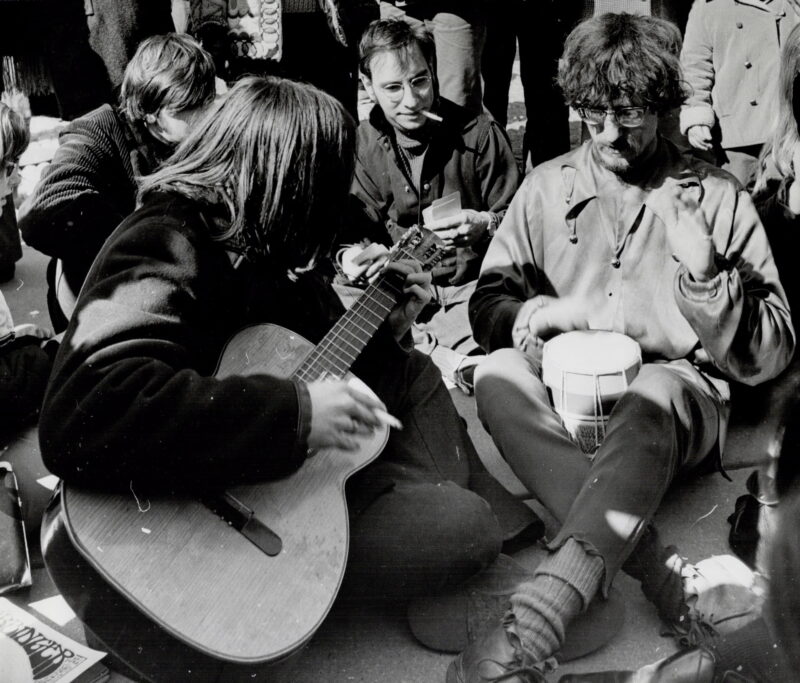
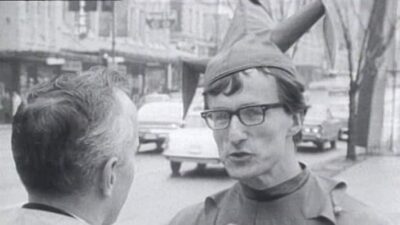
LSD seems to have helped him along. In a Buddhism class he took at UBC the professor had some of the students over to his place to drop acid. Not your typical academic experience perhaps, but it was the Sixties. Foikis had what seems like a bad trip, arms outstretched and feeling like he was undergoing a crucifixion. Perhaps it was guilt over the loss of his daughter Karen, Donaldson speculates. And then there was a vision. Foikis sometimes said he saw an angel. In any case he threw over his UBC studies, had his wife sew him a jester’s suit, and then took to the courthouse steps and also city hall and anywhere else in Vancouver (and elsewhere in the country, most usually Toronto’s Yorkville district) that struck his fancy: Broadway and Granville for one memorable “happening,” as he called it, with flutes and drums and dancing. Pigeon Park in the Downtown Eastside for another.
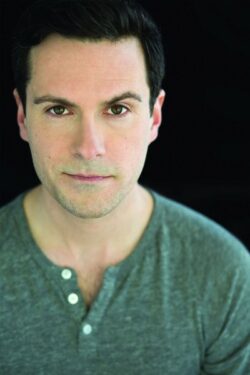
And in the midst of his Foolery his wife left him, taking their two surviving children with her to England, where she was from. The Foolery seems to have ended soon after (the chronology is a bit misty, though). In any case, on a flight to England to visit his estranged family, Foikis had a reverse epiphany: the magic was suddenly gone, and he could not be a Fool anymore.
After that he drifted around, from Toronto’s Rochdale College with the hippies (and he had already begun to look more hippie-ish, with long hair and a beard). Then back to the West Coast, living at times on the Downtown Eastside and then on various islands and finally in Esquimalt, surviving on his pension and spending time gardening. He went mad, said one friend; a Province article called his fate tragic; but a neighbour said he seemed at peace.
And then he died in a final burst of Folly, while dancing on a wall beside Victoria’s Inner Harbour.
What did it all amount to, this life of Foolery and beyond? Did he discover something others were missing? Was he merely one more expression of the Sixties zeitgeist? Was he a lost soul – or someone who could show us the way? And was he happy? Did he make us happy? Did he make us think? He didn’t want to be just an entertainer, he said; he wanted people to make fools of themselves in order to get beyond their everyday lives. Was he just dropping in on our lives, a visitor from Europe with a message of encouragement? Who can tell?
*

Sheldon Goldfarb is the author of The Hundred-Year Trek: A History of Student Life at UBC (Heritage House, 2017), reviewed here by Herbert Rosengarten. He has been the archivist for the UBC student society (the AMS) for more than twenty years and has also written a murder mystery and two academic books on the Victorian author William Makepeace Thackeray. His murder mystery, Remember, Remember (Bristol: UKA Press), was nominated for an Arthur Ellis crime writing award in 2005. His latest book, Sherlockian Musings: Thoughts on the Sherlock Holmes Stories (London: MX Publishing, 2019), was reviewed here by Patrick McDonagh. Originally from Montreal, Sheldon has a history degree from McGill University, a master’s degree in English from the University of Manitoba, and two degrees from the University of British Columbia: a PhD in English and a master’s degree in archival studies. Editor’s note: Sheldon Goldfarb has reviewed a dozen books for The Ormsby Review, most recently by Norman Ravvin, George L. Pál, Nicholas Bradley, Sherrill Grace, Philip Resnick, Miriam Nichols, Keith Maillard, and Edwin Wong.
*
The Ormsby Review. More Books. More Reviews. More Often.
Publisher and Editor: Richard Mackie
The Ormsby Review is a journal service for serious coverage of B.C. books and authors, hosted by Simon Fraser University. The Advisory Board consists of Jean Barman, Robin Fisher, Cole Harris, Wade Davis, Hugh Johnston, Patricia Roy, David Stouck, and Graeme Wynn. Scholarly Patron: SFU Graduate Liberal Studies. Honorary Patron: Yosef Wosk. Provincial Government Patron since September 2018: Creative BC
“Only connect.” – E.M. Forster
4 comments on “1051 The enigmatic Joachim Foikis”